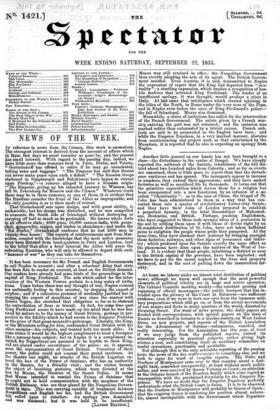It has been necessary for the French and English Governments
to call Naples to account ; and after a reluctant delay that state has been fain to render an account, at least on the British demand. Our readers have already had some hints of the proceedings in the capital of King Ferdinand. The acts which called for the inter- vention of the Western Powers pertain to a long series of irrita- tione. • Years before there was any thought of war, Naples evinced her unfriendly feeling to this country, by sto p' F the p
sulphur; and if a ridiculous pretence of neutrality justified her in stopping the export of munitions of war since the oontest with Russia began, she stretched that obligation so far as to obstruct the embarkation of flour or biscuit. In fact, for some time past King Ferdinand seems to have made up his mind that he was des- tined by nature to be the enemy of Great Britain, perhaps in pro- portion to the fidelity which he had sworn to the Emperor Nicholas as the price of that great monarch's patronage. Literally, the King, or the Ministers acting for him, confounded Great Britain with his other enemies—his subjects, and treated both too much alike. In some states it would be the highest compliment to treat a foreigner like a natural-born subject; but in Naples it is a compliment in- ierfed, for Neapolitans are assumed to be hostile to their King, and are placed' under surveillance of the police : so, it appears, were the representatives of Great Britain. Conscious of their power, the police could not conceal their proud insolence. At the theatre one night, an attache of the British Legation en- tered the box of the Prince of Satriano, who has an authority in the theatre, for a friendly visit ; and the visitor became the object of insulting gestures, which were directed at the hex by Mazza, the Director of the Secret Police, It seems that Massa intended to remind the Prince of Satriano that he ought not to hold communication with the members of the &Wall Embassy, who are thus placed by the Neapolitan Govern- ment in tapu. This was carrying equality of treatment between Neapolitans and English too far, and the British Government felt called upon to interfere. An apology :was demanded, and was tendered ; but it was held to be insufficient.
Mazza was still retained in office ; the Neapolitan Government thus overtly adopting the acts of its agent. The British Govern- ment insisted. Even Austria, it is said, transmitted to Naples the expression of regret that the King had departed from "neu- trality "; a startling expression, which implies a recognition of hos- tile motives that actuated King Ferdinand. The tender of an insufficient apology, it was thought, would produce a crisis in Italy. At last Caine that intelligence which created rejoicing in the cities of the North, in Rome under the very nose of the Pope, and in Naples even before the eyes of King Ferdinand's police— the fall of Sebastopol. Mazza was dismissed.
Meanwhile, a series of irritations has called for the intervention of the French Government. The salute given by a French war- ship entering the port was not returned; and the omission was marked rather than extenuated by a trivial excuse. French sub- jects are said to be persecuted as the English have been ; and while the Emperor Napoleon, in a very marked manner, abstains from countenancing any project such as that entertained by the Muratists it is reported that he also is expecting an apology from Naples.


























